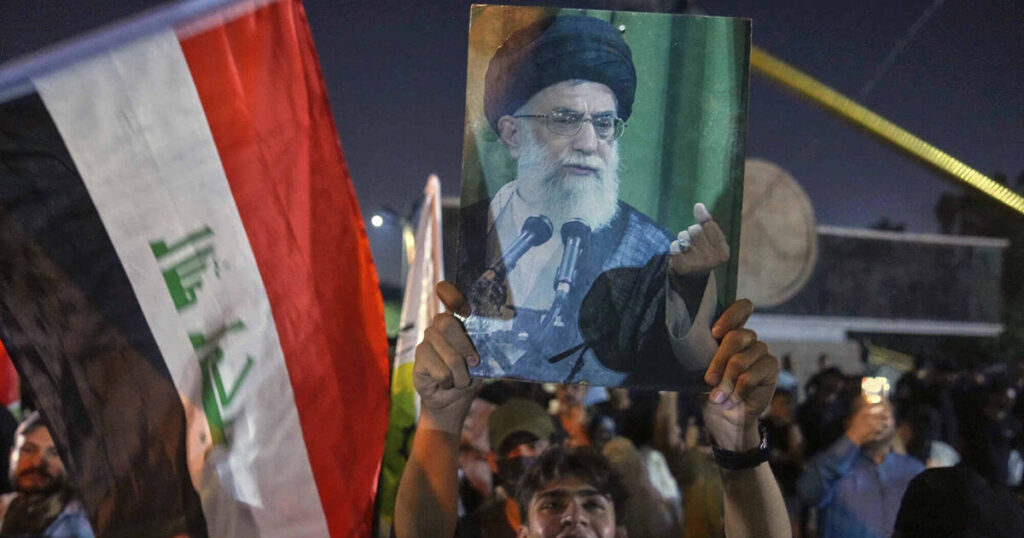Israel has claimed to have killed a top Iranian general as it traded more strikes with its long-time foe, as US President Donald Trump warned residents of Tehran to evacuate while demanding that Iran surrender without conditions.
Mr Trump left the G7 summit in Canada a day early to deal with the conflict between Israel and Iran, telling reporters on Air Force One during the flight back to Washington DC: “I’m not looking at a ceasefire. We’re looking at better than a ceasefire.”
When asked to explain, he said the US wanted to see “a real end” to the conflict that could involve Iran “giving up entirely”.
He added: “I’m not too much in the mood to negotiate.”
Later, he warned Supreme Leader Ayatollah Ali Khamenei that the US knows where he is hiding and called for Iran’s “UNCONDITIONAL SURRENDER”.
Mr Trump’s hard line added to the uncertainty roiling the region on the fifth day of Israel’s air campaign aimed at Iran’s military and nuclear programme.
Residents of Tehran fled their homes in droves, and the UN nuclear watchdog for the first time said Israeli strikes on Iran’s main enrichment facility at Natanz had also damaged its main underground section, not just an above-ground facility, as previously acknowledged.
Israel says its sweeping assault on Iran’s military leaders, nuclear scientists, uranium enrichment sites and ballistic missile programme is necessary to prevent its adversary from getting any closer to building an atomic weapon.
The strikes have killed at least 224 people in Iran.
Iran has retaliated by launching some 400 missiles and hundreds of drones at Israel. So far, 24 people have been killed in Israel.
– Israel targets more Iranian leaders
The Israeli military claimed to have killed another top Iranian general in a strike on Tehran.
Iran did not immediately comment on the reported killing of General Ali Shadmani, whom Israel described as the most senior military commander in Iran.
General Shadmani was little-known in the country before being appointed last week to a chief-of-staff-like role as head of the paramilitary Revolutionary Guard’s Khatam al-Anbiya Central Headquarters.
That appointment followed the killing of his predecessor, General Gholam Ali Rashid, in an Israeli strike.
The Israeli military warned the population to stay close to shelters as Iran fired new salvos of missiles, but officials said most were intercepted.
Sirens blared in southern Israel, including in the desert town of Dimona, the heart of Israel’s never-acknowledged nuclear arms programme.
Iran has fired fewer missiles in each of its barrages, with just a handful launched late on Tuesday.
It has not explained the drop in missiles fired, but the decline comes after Israel targeted many Iranian launchers.
Meanwhile, Iran’s state-run IRNA news agency reported Israeli airstrikes around the city of Isfahan, with air defences also firing.
A series of explosions and anti-aircraft fire boomed throughout Tehran just before 6.30pm.
– Shops closed, lines for gas in Iran’s capital
Echoing an earlier Israeli military call for some 330,000 residents of a neighbourhood in downtown Tehran to evacuate, Mr Trump warned on social media that “everyone should immediately evacuate Tehran”.
Tehran is one of the largest cities in the Middle East, with around 10 million people, roughly equivalent to the entire population of Israel.
People have been fleeing since hostilities began.
Asked why he had urged the evacuation of Tehran, Mr Trump said: “I just want people to be safe.”
Downtown Tehran emptied out early on Tuesday, with many shops shuttered, even the ancient Grand Bazaar, which has closed only in times of crisis, such as during the 2022 anti-government protests and the coronavirus pandemic.
On the roads out of Tehran to the west, traffic stood bumper to bumper.
Many middle- and upper-class Iranians were headed to the Caspian Sea, a popular getaway spot.
Long lines snaked from Tehran’s gas stations. Across the city, billboards called for a “severe” response to Israeli strikes.
– Signs that Iran is restricting access to outside world
Iranian authorities appeared to be curbing the public’s access to the outside world.
Phone and internet service appeared disrupted, with landline phones unable to receive or dial international calls.
NetBlocks, an internet monitoring group, reported that it had detected a significant drop in internet traffic from the country.
Iran, which has crippled important communications tools in past nationwide protests and during the 1980s Iran-Iraq war, did not acknowledge any restrictions.
International websites appeared to be blocked, but local websites were functioning, likely signalling that Iran had turned on the so-called “halal net”, its own locally controlled version of the internet aimed at restricting what the public can see.
In another sign of restricted access, Iran’s state TV on Tuesday urged the public to remove the messaging app WhatsApp from their mobile phones, alleging without evidence that the app gathered user information to send to Israel.
In a statement, WhatsApp said it was concerned that “these false reports will be an excuse for our services to be blocked at a time when people need them the most”.


